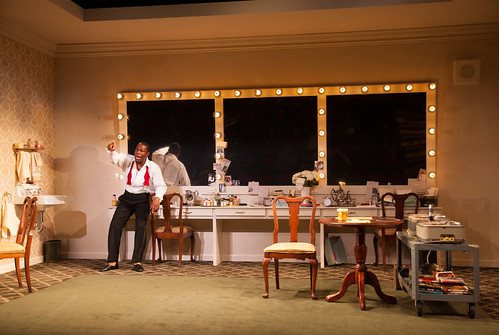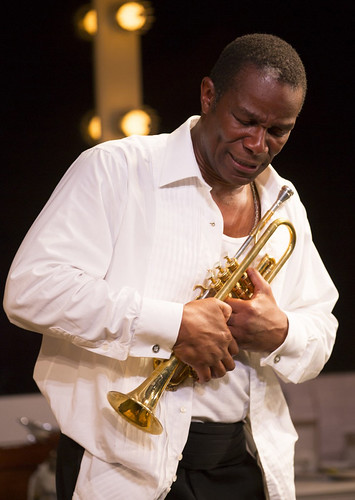Pops is tops in ACT's Satchmo
 John Douglas Thompson is Louis "Satchmo" Armstrong in Terry Teachout's Satchmo at the Waldorf, running at ACT's Geary Theater through Feb. 7. Photos by T. Charles Erickson.
John Douglas Thompson is Louis "Satchmo" Armstrong in Terry Teachout's Satchmo at the Waldorf, running at ACT's Geary Theater through Feb. 7. Photos by T. Charles Erickson.
John Douglas Thompson is tall and handsome, which is to say, he looks nothing like Louis Armstrong. But so deft is Thompson's performance as the legendary trumpeter in Terry Teachout's captivating Satchmo at the Waldorf that audiences could almost swear they were in the company of the late, great man himself.
Thompson doesn't really do that much to conform to our idea of the jolly Armstrong. He hunches over and walks with a limp and gives his voice a little of that "sawmill" quality (as Armstrong describes it in the play) that helped make Armstrong such a beloved singer as well as instrumentalist. Somehow, the illusion is complete. Through body language, intonation and sheer force of warmth and personality, Louis Armstrong lives (and please, as per Mr. Armstrong, it's Lew-is, not Loo-ee).
This is the first play from Teachout, the longtime theater critic at the Wall Street Journal, and it's already taken on quite a life since its 2011. Thompson has been in multiple productions of the drama, so it's no wonder audiences have flocked – this actor puts on a show well worth seeing. The play offers him a sturdy vehicle in which to make a clear case for Armstrong as something more, something deeper, than the amiable, grinning personality most of his audience knew from TV and radio whose jokes and songs began to overshadow his considerable jazz chops.
The Armstrong we meet here is not long for this world. He's nearly 70 and enjoying a cozy gig at the Waldorf Hotel. He will die shortly thereafter in his Queens home, but on this night, after a show, he's in a talkative mood, which is a good thing because there are a lot of people who want to hear what he has to say about his storied career, which began in boys' home marching band (after a wild youth in New Orleans), his attitude toward performing (he swears he just wants to make people happy) and what other people think of him (Miles Davis can take a giant leap).
The man who comes across in this intimate setting is foul-mouthed (in rather a delightful way) and sincere, proud of his accomplishments and bitter about how he was treated by his longtime manager, Joe Glaser (a mobbed-up Jewish guy whose fortune was made on Armstrong's back) and by his fellow musicians, most notably Davis (whom Thompson also plays, briefly, in a withering portrait) and Dizzy Gillespie, who made an unkind remark in a Time magazine story that featured Armstrong on its cover.
Playwright Teachout clearly knows his subject deeply – he should, having written a critically acclaimed 2009 biography (Pops: A Life of Louis Armstrong) – and clearly he loves his subject deeply. This is a compassionate portrayal of a mine many, like Davis (though perhaps not as harshly), passed of as a sweaty, smiley artifact of days gone by. There's a whole lot about race in this story, and it's good to be reminded about what it was like for African-American entertainers to do their jobs in the decades leading up to the Civil Rights Movement. Armstrong reminds us that he broke certain barriers at swanky hotels and even shared billing with Bing Crosby in a movie (Pennies from Heaven, 1936), though Crosby never invited Armstrong to his home in all their years of friendship.
Director Gordon Edelstein and Thompson work together like a finely tuned machine. There's nary a misstep in the play's 90 minutes. The dressing room set by Lee Savage is realistically appointed, and there are some visually arresting moments involving lighting shifts (design by Kevin Adams that help delineate character changes, although Thompson's portraits of Glaser and Davis are so crisp, he could do them under a single light bulb and we'd get it.
In Thompson's hands, Armstrong comes across as smart as well as affable and as edgy as he was sweet. He made certain choices in his career, some at the behest of his manager (whom he looked to as a kind of farther figure), and he was well aware what he was doing. WE also see an abundant sense of humor (not always gentle), and that's especially rewarding. We also get the sense of a man deeply connected to his music and its beauty. He never plays the trumpet (though he does sing a tiny bit – one big hit and one a surprising choice), but he plays some recordings of his work (most notably "West End Blues), and hearing that horn is all the more moving for knowing the man behind it just a little bit better. You definitely wan to check in to the Waldorf and spend some time with this Satchmo.
[bonus interview]I talked to playwright Terry Teachout and actor John Douglas Thompson about Satchmo for a story in the San Francisco Chronicle. Read the feature here.
FOR MORE INFORMATIONTerry Teachout's Satchmo at the Waldorf continues through Feb. 7 at ACT's Geary Theater, 415 Geary St, San Francisco. Tickets are $20-$105. Call 415-749-2228 or visit www.act-sf.org.
